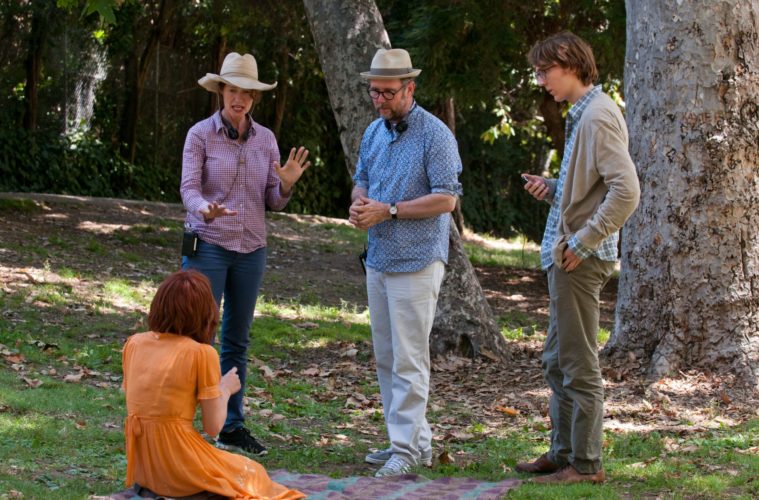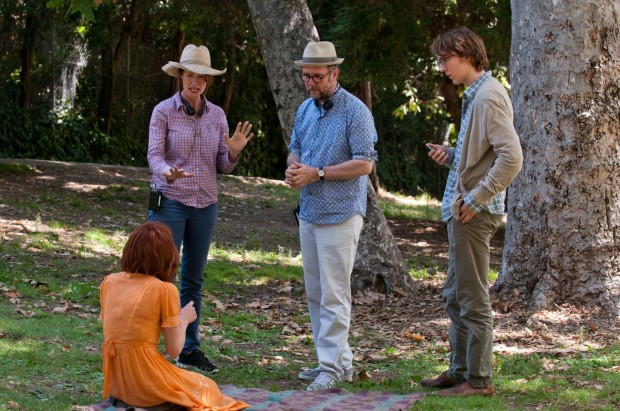
Ruby Sparks marks directing duo Jonathan Dayton and Valerie Faris‘ follow-up to their hit Little Miss Sunshine and maintains the honesty, humor, and darkness that made that film such a hit. Written by star Zoe Kazan, this tale follows a struggling writer (Paul Dano) who creates his dream girl in his latest novel and she suddenly appears in his apartment. A few weeks ago I had the pleasure to sit down with Dayton and Faris as we discussed the blending of the soundtrack and the film, gathering the extraordinary cast, the dynamic of having couples in front and behind the camera, and much more.
Before we jump into the conversation, I want to warn that we talked about a major sequence near the end of the film. The result is incredibly spoiler heavy, but I encourage anyone that sees the film as it slowly expands in the coming weeks to return here. The discussion is still worthwhile and in-depth for those who haven’t seen the film yet so, read on below and enjoy.
The Film Stage: So how did you get involved in this project?
Jonathan Dayton: Paul [Dano] and Zoe [Kazan] brought in two of the producers from Little Miss Sunshine, Ron [Yerxa] and Albert [Berger], and together they came to us with the first draft of the script. We loved it right away. We signed on and immediately started working with Zoe on a new draft. We loved all the themes it explored and were excited to dig into what the film would be. Where would this go? And we knew that she was going to have to act in it, so we didn’t want her to have to split her duties when it came time to actually make the film. So it was very important to us to get the script exactly right.
I remember talking to you when Sunshine came out, and you said that you really worked hard with that script, and acted it out in a garage? Is that right? The dance sequence?
Dayton: Yes! Ha. That’s true. And we did the same on this.
Valerie Faris: We just took advantage of the fact that there’s two of us, and it allows us to explore the scenes together privately and have a sense of what we’re going to be asking of our actors. ‘What are the feelings in this scene? Where’s the conflict and the tension?’ The more you know going in, the better. So we always just try to put ourselves through the paces as much as we can so that on the set, we really know what we’re chasing after.
Dayton: We’re not writers. We are always heavily involved, but there is a period where we have to take the reigns. Zoe’s been with this for a year, writing it. We need to have the same deep connection.
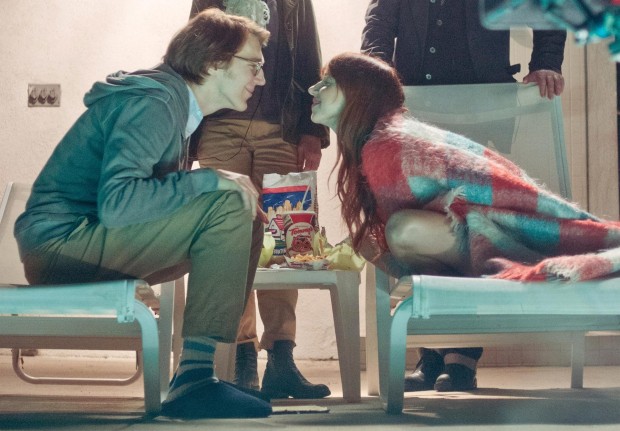
I’ve had some interesting discussions with male and female directors. Do you [pointing to Faris] field a lot of questions from the female cast? Is it disproportionate because of the simple fact that you are a female and you are a male?
Dayton: We both do everything, but I certainly think the fact that we have both male and female experience represented… When Chris [Messina] says, ‘For men everywhere, please don’t let this go to waste’, I know what he’s talking about!
Faris: I do too.
Dayton: Yea, but from a different point of view.
Faris: I think, if anything, we relate to the material but from slightly different points of view. So we bring both those perspectives to the work. But in terms of dealing with the cast, we really mix it up and if anything, I might be in the fitting room when we’re fitting a woman or getting the costume or wardrobe worked on. He’s not in the room.
Dayton: Even though actors are very comfortable.
[Everyone laughs]
Faris: They are, yea. Especially Zoe, who’s very… she had to bare a lot on this movie. But I think we’ve done it together for so long that we really work hand-in-hand at all times. I don’t think of myself as a woman filmmaker. I think of myself as a filmmaker and I’m part of a partnership. Obviously I bring my experience and my gender’s part of that, but it’s just not my focus, I guess.
Dayton: There’s ‘Male’, ‘Female’, and then ‘All of the Above’. And I think we’re ‘All of the Above’.
[Everyone laughs]
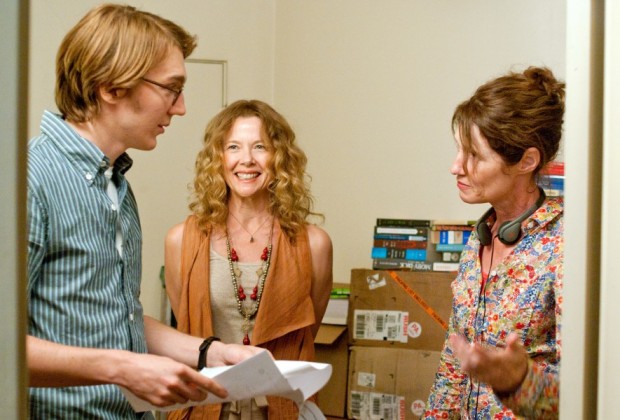
Kind of keeping on that same question, what about that script? Because I was amazed at how Zoe captured the male point of view so well. Especially Calvin’s character. He has such a change. He has a very deep past. I’m curious how much did you add to the male characters or was it already there?
Dayton: I think she deserves a lot of credit. A great deal of it was there. We worked on streamlining. There were sub-stories that were there that we took out. We made the last 30 minutes a little different. The great thing about Zoe is that she’s an incredible re-writer. So she wrote everything.
Faris: We’d throw an idea out about what we were thinking. She wasn’t precious or possessive with the material. She’d go, ‘OK, let me go try that.’ Then she’d come back with something that was usually better than what we had imagined. That’s very rare for a writer, especially for a first-time screenwriter.
Dayton: But yes, I think she captures it. I think what’s interesting about the story, one of the reasons we wanted to do it, was that with this strange fictional premise, you actually get to a lot of human truths. Both for men and women.
Faris: I think she really identified with the role of the writer in Calvin. So I think she felt very close to that character. In fact, she said that when we started filming and she had to play Ruby, she realized how she had really written the script from Calvin’s point of view. There were a few things and we all noticed it in the scene where he discovers her in the house. The Ruby character didn’t do a whole lot in that scene. She didn’t react at all to his odd behavior. We realized, ‘She’s got to do something! I mean, he’s acting so strange.’ And she’s just standing there. So there were little things like that where once she embodied the role of Ruby, she started to really see the movie from her point of view for the first time. That was interesting.
Did she ever say, ‘Who wrote this!?’
Faris: [Laughs] While she was performing some lines, ‘Damn the writer.’ I’m sure she thought it. But it is interesting to work with a performer and a writer because some writers, it’s all in their head, and they’ve never performed anything before. So sometimes they write things that are very hard to actually perform. So I think there’s a real advantage to having somebody who has had to deliver a role or certain lines. I think they bring with them that experience into the writing. Or she does, anyway.
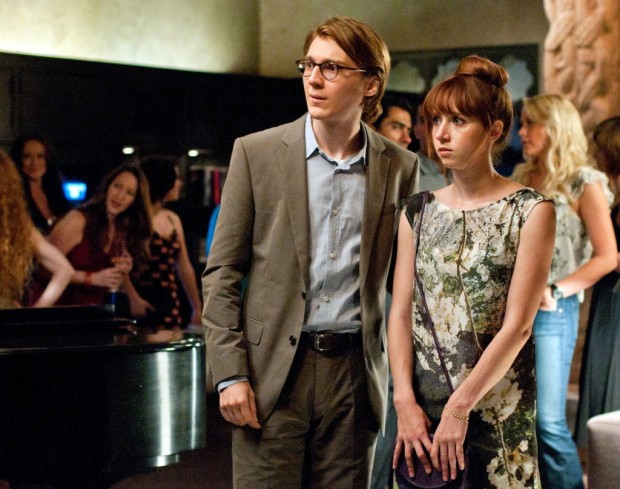
We’ve seen a lot of films about struggling writers over the years but it’s nothing quite like this. Was that part of the appeal for you guys, as well?
Dayton: Yeah, absolutely. I think that in a way this story has two, very distinct thematic roads. And one is about relationships, but it’s also about the creative process. Trying to create something that has life. I can only liken it to making a film where as a director you try and control every moment. You puppet actors and just control every bit. You ultimately get kind of a lifeless, mechanical piece but our job is to just encourage and stoke the flames that are starting all over the set. Make it come together.
Faris: And you have to really watch what’s happening. And in the same way that Calvin creates Ruby, but once he tries to control her it falls apart. I think we were interested in that idea of sometimes with creative work you want to get every thing exactly the way you wanted it, but there is an element of give and take even within a relationship as well as in the creative process.
Dayton: Oh, and he [the publicist, Martin Long] has soundtracks for everyone. And one of the things I hope you guys can all listen to that because the soundtrack was something that we worked really hard on. We spent months where we moved the composer into the edit suite. Instead of handing over the finished film and saying, ‘Alright, write some music,’ he saw it at every stage and we would spend hours with him working on the themes and then put them into the film and change the film sometimes when we needed a phrase to finish.
I noticed when you used “The Game Of Love” in French.
Dayton: Yes.
I’m sitting in there thinking, ‘What song is that?’
Faris: ‘I know this song!’ Ha.
Dayton: Well, that was really fun. One of the things we hate in movies is when they use a pop song to make sure you know, with a baseball bat, what is happening in this scene.
[Everyone laughs]
Dayton: And so we thought that…
Faris: One step removed. Ha.
Dayton: If you could have all the lyrics in French, then people wouldn’t know what is being said. But in that case, they certainly do apply but you have to kind of know.
Faris: Such a great song, originally, but this is a recording from the ’60s by Sylvie Vartan. It was a hit in the ’60s in France.
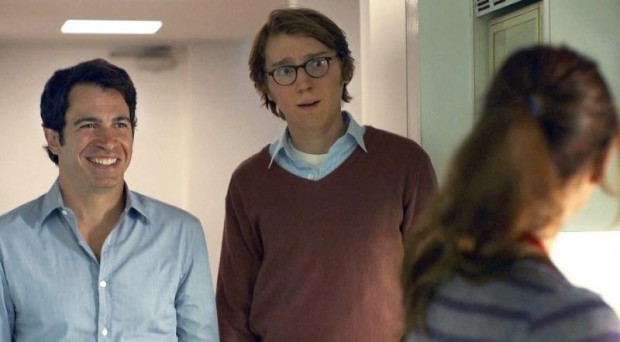
How was the dynamic with couples in front and behind the camera?
Faris: Couples and couples? Really, what’s great is that we’ve worked together for such a long time and Paul and Zoe have been together for almost five years. We all have a really good rapport. So the lines of communication are really good. And you can’t hope to have more committed actors. Partially because she wrote it, and he was with her through every stage of her writing it, so they were so invested in their parts and in the film and that’s a real luxury. Just to have the actors that with you on it. You just feel like they’re giving it their all. The couple aspect of it, I think, is more interesting from the outside but from our point of view it’s just what we do. We don’t think about it that much.
Dayton: But we love Paul and Zoe, and I think they like us a lot, and it was such a luxury. We don’t tend to have this problem, but sometimes sets can be incredibly tense and this was a really loving environment and hopefully you see that on the screen. That’s what happened on Little Miss Sunshine and even though it’s a very different story, some of those qualities hopefully translate.
What about some of your other casting choices? Antonio Banderas… Chris Messina was amazing.
Faris: I love Chris.
Dayton: Isn’t Chris great?
Faris: That was a key role. I think he makes the movie work ultimately because he’s the one you have to convince that she’s real. So you watch him go through all the stages of, you know, ‘You could be crazy.’ He gives every possible explanation he can except that she just appeared in his house. So once he’s convinced, I think it really helps the audience just buy into the concept. And he does it in such a relatable and every-man. I mean, he has that quality. He’s a very grounded, sober guy. When you see him flip out it’s funny.
Dayton: Just quickly, the other actors, Antonio and Annette [Bening], we just met with them and talked about the kind of movie we wanted to make and they certainly loved the script. And these are people who, in this point in their careers, want to try something new and want to have fun. They want to work with other actors and filmmakers.
Faris: They’re not looking for a paycheck.
Dayton: So they were very receptive. Annette, we went and had lunch with her and she said during the lunch, ‘I want to do your movie.’ There was no, ‘I’m going to have my agent call your agent.’
Faris: Or just, ‘Thank you, nice to meet you.’
Dayton: Really honest and direct.
Faris: Elliott Gould… We were just excited to have a lunch with him.
[Everyone laughs]
Faris: And then the fact that he said he would do the movie kind of blew us away.
Dayton: But a guy like that brings so much. You get a world.
Faris: Like with Alan Arkin. I just think it’s so fun to be able to work with people you’ve admired over the years and that’s exciting that they’re still doing interesting work. He was just an incredible guy. I think Paul was really honored to get to do those scenes with him.
**Spoilers ahead**
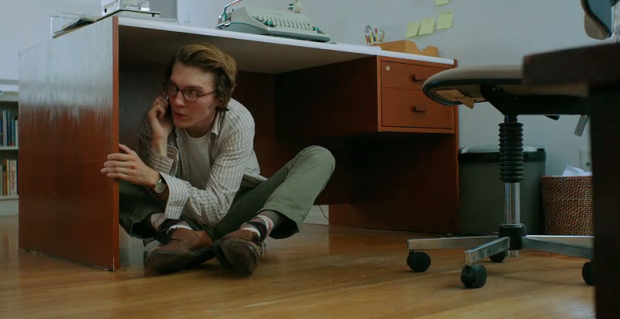
Dayton: There’s the one scene in the movie, the one that we don’t want to talk about in the press so much, but it is kind of the climax where it is a pretty dark scene. It was exciting to us… the idea of having to do something like that. But we had never seen it before. It’s not…
Faris: And it wasn’t really described on the page the way that it is in the film, so it was probably the least thought out in terms of the script. And we changed a fair amount from that portion to the end. So that’s kind of fun for us because we get to explore it and figure out what it is. It was hard for Zoe to write that scene anyways, and we really didn’t figure it out completely until the day we were shooting it and then ultimately in the edit. That’s where you really end up writing…
Dayton: But we got to experiment telling each other what to do.
Faris: Don’t brag about that.
[Everyone laughs]
So that sequence there was not choreographed?
Dayton and Faris: No, it was.
Dayton: It’s a little bit like when you do a sex scene in a movie and you have two actors… even though these two were very close, usually the director has to tell the actors exactly what to do. ‘Put your hand on their lower back. Reach around and kiss them.’ Because you don’t want this thing where the fellow actor thinks that you, as an actor, is making this move on your own. You know? It’s very touchy.
Faris: We just came up with a list of actions that he would give her and she did them in a series. But she didn’t know what those actions were going to be until the morning of the shoot. We went over them with her and we said, ‘OK, this is what it’s going to be.’ And each take was about eight to ten minutes long.
Dayton: It was brutal.
Faris: But I think she just didn’t like the idea of even thinking about it throughout the movie. I think it was nice… it was the very last scene we shot. So it was sort of nice to have been through the whole relationship in the movie and then… that’s kind of the end of their relationship. So it was nice that it was the last thing that we shot.
So it was kind of like improv for her?
Dayton: In the sense that she had to react…
Faris: When we gave her the moves, we gave her, ‘You’re going to snap your fingers. You’re going to roll around the wall saying ‘I love you, I’ll never leave you.’ You’re going to get down on the ground and bark like a dog.’ She had a very clear set of actions and whatever she was saying at the same time. So it was choreographed.
Dayton: One of the things we did was we didn’t tell her when we were going to…
Faris: Stop.
Dayton: So we had these pipes. Every time we clanked these pipes she would go to the next one. But she didn’t know if she was going to have to bark like a dog for two minutes, or ten minutes, or one minute. So there’s that…
Faris: And she grabbed the book off the shelf. Like, certain things she did were her own, too. His book was right there, so she decided to grab the book off the shelf and put it into her mouth. So there’s some improv in there, but the actions were very clearly laid out.
Dayton: So it was a really tricky scene, but that was one of the things that excited us about it. I’m curious how you all felt, but a lot of times people don’t want to go to a hard place. Studios don’t want you to go to a hard place. They want to keep it all light and fluffy. But what we liked was that this was a roller coaster ride. You could start laughing and go through all these different places…
Faris: Like you do in relationships. They’re not always just fun. They’re challenging and they teach you about yourself. So we wanted it to feel more—even though there’s this element of magic in this movie—we really wanted all of the drama to feel like it came from real life.

Did you tell Paul what she was going to do?
Dayton: He knew, yes. Although he watched her… you know, you film one side and then you film the other. So he watched her, first.
Faris: So he knew what she was…
What about the sequence when she’s banging? Because that’s when it hit the dark moment.
Faris: That was Paul’s idea to hit the desk.
Dayton: But what’s important, and I hope this is clear, we always felt that this was a scene where it was as much Paul doing it to himself as he was to her. So, by that point when he’s making her say the one sentence that he hates more than any, he’s just… he’s losing it. We compared it to an alcoholic who goes on a drinking binge. He has to…
Faris: Hit that rock bottom before he can come back. I think what’s happening in that sequence is he’s realizing this is impossible. ‘I can’t sustain. This is not a healthy relationship. I need to make her not love me.’ So, there’s a lot going on there.
But part of this is the emotions that you’re showing throughout the film. It’s not just that scene. It’s how important emotions are in any relationship and how it can affect your faith.
Dayton: Absolutely.
Faris: We were drawn to the idea that all relationships start out as fantasy. The person you’re with, you have this sort of… fantasy of who they are. And as the relationship goes on, you are getting to know the person. They’re becoming more real, and it’s about whether…
Dayton: You can handle that.
Faris: Yeah. Whether you can reconcile the fantasy with the real person and that sort of determines whether the relationship is going to work out. And to some degree, you always maintain some level of fantasy in a relationship, I think for it to work.
Dayton: It’s how you keep going. And you, a lot of times, enjoy the fact that your partner thinks of you in a certain way that is positive.
Faris: They see the better you.
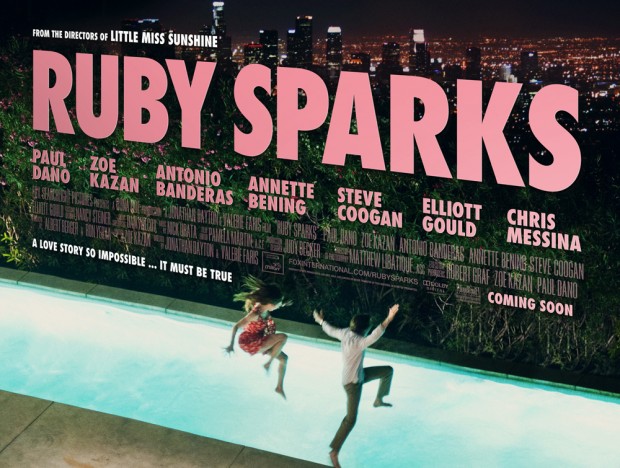
Ruby Sparks is now in limited release.

